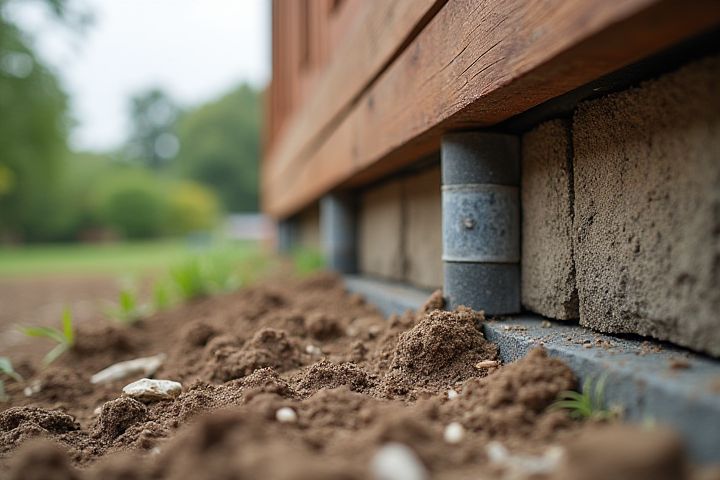
House foundation repairs often involve assessing structural issues such as cracks, uneven floors, or doors that stick. Common causes include water damage, soil settlement, or poor drainage, which can weaken the foundation over time. Repair methods vary; some homeowners might opt for piering, slabjacking, or wall anchors to reinforce stability. Regular inspections by a qualified foundation specialist can help detect early signs of distress, potentially saving you from costly repairs later. Understanding these aspects ensures that you can maintain the integrity of your home and protect your investment effectively.
What To Know About House Foundation Repairs
Signs of damage
Signs of damage to a house foundation can include visible cracks in the walls, particularly those that appear above doorways or windows. You might also notice uneven floors, which can indicate shifting foundations, making it essential to measure the slope and compare it with acceptable ranges. Another indicator is doors and windows that stick or fail to open and close smoothly, suggesting misalignment due to foundation issues. Addressing these signs promptly can prevent further structural damage, with repair costs ranging from $2,000 to $30,000 depending on the severity.
Causes of foundation issues
Foundation issues often stem from soil movement influenced by moisture fluctuations, particularly in clay-rich soils, where expansion and contraction can cause significant shifts. Another common cause is poor drainage; without proper water management around the foundation, excess moisture can accumulate, leading to erosion and settling. Furthermore, tree roots seeking moisture can undermine foundation stability, while heavy landscaping or excessive irrigation can exacerbate these problems. Understanding these causes is vital for homeowners, as early detection and remedial action can prevent costly repairs, which can range from $2,000 to over $30,000, depending on severity.
Types of foundation repairs
When it comes to house foundation repairs, it's essential to understand the various types available. Piering, a method often used for deeper foundation stabilization, involves driving steel or concrete piers into the ground below your foundation, anchoring it to stable soil or bedrock. Slabjacking is another technique that involves pumping a special grout under the concrete slab to raise it back to its original level, addressing issues like sinking foundations. Finally, a simple yet effective measure is the installation of drainage systems, which helps divert water away from your foundation, preventing future damage caused by moisture-related issues.
Cost factors
When considering house foundation repairs, key cost factors include the extent of damage, type of foundation, and location. On average, foundation repair costs range from $2,000 to $7,000, with major issues potentially exceeding $15,000. Soil conditions play a crucial role; expansive clay or poorly draining soil can increase repair complexity and expenses. You should also account for potential permits and inspections, which may add to your overall budget.
Professional assessment
A professional assessment for house foundation repairs typically begins with a thorough inspection by a licensed contractor or structural engineer, who will evaluate visible cracks, structural integrity, and drainage issues. Expect to pay between $300 and $800 for this initial assessment, depending on the complexity and size of your property. During the evaluation, the expert will utilize specialized tools and techniques such as level surveys or soil testing to identify underlying problems. It's crucial to address foundation issues promptly, as delaying repairs can lead to greater structural damage and costs that can escalate into tens of thousands of dollars.
Repair timelines
Repair timelines for house foundation repairs typically range from a few days to several weeks, depending on the severity of the damage and the methods used. Minor issues, such as cracks or settling, may require only 1 to 3 days to fix, while significant foundation problems often necessitate extensive reinforcement or underpinning, extending the timeline to 2 to 4 weeks. Weather conditions and the availability of repair specialists can further influence these timelines, so it's essential to factor in local climate and contractor schedules. Understanding these timelines will help you plan your home improvement projects efficiently and minimize disruption to your daily life.
Drainage solutions
Proper drainage is crucial for maintaining the integrity of your house foundation, as excess water can lead to soil erosion and foundation settlement. Implementing effective drainage solutions, such as installing gutters and downspouts, diverts rainwater away from your home, preventing pooling around the foundation. French drains and sump pumps can also help manage groundwater levels, reducing hydrostatic pressure on the foundation walls. Ensuring your landscape slopes away from the house creates an additional barrier against water accumulation, safeguarding your property from potential foundation damage.
Impact on home value
House foundation repairs significantly influence your home's value, with estimates suggesting that professional repairs can enhance property worth by 10% to 15%. A sound foundation prevents structural issues that could deter potential buyers, making timely repairs essential for maintaining marketability. Ignoring foundation problems often leads to escalating damages, reducing long-term home equity and potentially increasing repair costs. Ideally, you should conduct regular inspections, as homes with well-maintained foundations attract more competitive offers in real estate markets.
Warranty options
When considering house foundation repairs, understanding warranty options is essential for your peace of mind. Most reputable foundation repair companies offer warranties that can range from 5 to 10 years, covering various aspects of the repair work. Some warranties are transferable, adding value to your property if you decide to sell within that timeframe. Always read the fine print to understand what is included, as some warranties cover only specific types of repairs or damage.
DIY limitations
Understanding the limitations of DIY house foundation repairs is crucial for ensuring safety and effectiveness. Most foundation issues, such as settling or cracking, often require expertise beyond typical homeowner skills. For instance, significant repairs may need professional evaluation, especially when structural integrity is compromised, which affects an estimated 25% of homes in the U.S. You should also consider that specialized tools, like hydraulic jacks or underpinning systems, are often necessary for safe and effective permanent solutions.
